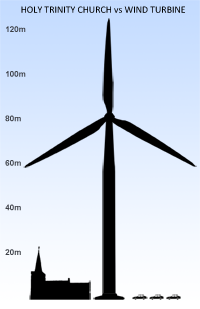- Home
- Proposals
- The Arguments
- About Us
- News
- BBC bias on climate change
- Latest News
- Climate change balance lost by BBC
- Energy Prices-The Times
- Turbines trash landscape benefit billionaires
- Global Warming Panic Over!
- Mini-Nukes the future
- The dirty secret of Britain's power madness
- Extreme weather the new Global Warming
- Tax Payers Alliance Energy view
- Britain can't afford wind power
- Fracking = prosperity?
- Its time to drill- Times leader
- Thoughtful article on Fracking
- Wind double subsidised
- Deluded energy policy
- The EU U-turn over energy
- Windfarm Wars Company in Churchover
- New noise guidance increases risk of harm
- Peter Lilley MP, Delingpole's new hero
- Shale Gas update 2013
- Maggie U-turned on Global Warming
- Devastatingly sad news
- 'smart' energy technology
- Engineers surveyed 2011
- Lord Turnbull speaks out
- Miracle shale gas
- Planning application refused!
- Warwickshire heritage beauty spot protected!
- Press
- Articles
- Letters
- How To Help
- Donations
- Letters of Objection
- New Churchover PC Objection
- New Historic England Objection
- Churchover Resident Objection
- CPRE Objection
- English Heritage Objection
- Objection by expert R&F historian
- Leicestershire County Council objection
- Warwicks CC Ecology objection
- Harborough District Objection
- Churchover PC Objection
- Bitteswell PC Objection
- Pailton PC objection
- Some other Objections sent
- Rugby BC Planning Committee
- Contact Us
Scots windfarms paid cash to stop producing energy
Scots windfarms paid cash to stop producing energy!!
Wind farm operators in Scotland were paid nearly £900,000 to keep their turbines idle for a night because the National Grid did not need the power.
The payments, up to 20 times the value of the power the wind farms would have produced, were offered by the National Grid because it urgently needed to reduce electricity entering the system.
It was oversupplied with power on a wet and blustery night last month when demand for electricity was low.
Although the power could have been used in England, the transmission cables lacked the capacity to carry it south. The Scottish turbines were disconnected and the operators received six-figure sums to compensate for the loss of their subsidies and the income from the power they would have sold.
The disclosure of the subsidy payments has called into question the economic logic of the subsidies paid out to wind farms. It will pose awkward questions for Charles Hendry, the energy minister, because the cost of the payments ends up on customers’ bills.
A typical turbine generates power worth about £150,000 a year, but attracts subsidies worth £250,000 — designed to encourage power companies to create more wind farms. The subsidies are added directly to consumer bills.
The payments emerged in research by the Renewable Energy Foundation, a green think tank.
John Constable, its director of policy and research, blamed the government for building too many wind farms in northern Britain without ensuring there were enough high-voltage cables to take the power southwards to cities where it was most needed.
“Hasty attempts to meet targets for renewable energy mean some Scottish wind farms are now in the extraordinary position of not only printing money when they generate, but printing it even faster when they throw their energy away,” he said.
In the switch-off, Scottish Power, which owns Whitelee wind farm near Glasgow, received more than £312,000 to stop production for about six hours, four times the wholesale value of the power it would have generated in that time.
Similarly, Farr wind farm, a 40-turbine development 10 miles south of Inverness run by Npower Renewables, got £263,000 to switch off for a few hours. Here the payment was about 20 times the value of the power it would have generated.
On land in South Ayrshire part-owned by Alex Fergusson, presiding officer of the Scottish parliament, a wind farm operated by Scottish and Southern Energy was paid £134,000 to switch off 52 turbines — about 3½ times the value of the power it would have produced.
The Millennium wind farm near Fort Augustus, given £33,000 to switch off its turbines, defended the compensation payments. It said it received so much because wind farms in the far north pay high fixed fees to connect to the grid. “If wind farms are asked to switch off it is only fair they are compensated,” it said.
Wind turbines produce less than 5% of power needs. Britain is committed to a target of producing 20% of power from renewable sources by 2020.
The National Grid confirmed it had made the payments. “On the night of April 5 and 6, the demand for power was low but the nuclear generation plants in Scotland were running as expected. There was also heavy rainfall, which meant hydro power plants were operating well, too,” a spokesman said.

